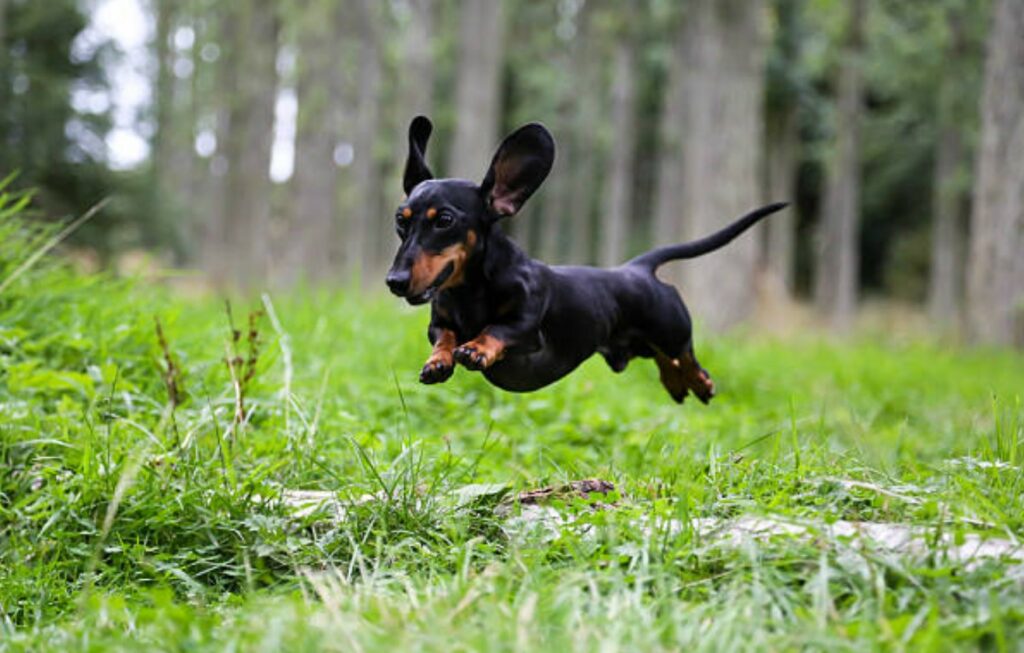All dog owners know that puppies are not calm at all times. They are constantly wiggling, barking, and chewing on everything in sight.
But when do dachshund puppies calm down? What is the Temperament of a dachshund by age?
In this blog post, we will answer these questions and more. We will delve into the different temperaments of dogs and explain why puppies aren’t calm when they are young.
We will also discuss the behavior of dogs in general by age, and if your dachshund isn’t quite as calm as you’d like, don’t worry- we’ll give you some tips on how to help him out!
What Influences Your Dachshund Puppy’s Behavior?
There’s a lot of mystery when it comes to the behavior of dogs. Why are some dogs seemingly calm while others have boundless energy? Why are puppies generally crazy? Do dogs’ personalities change with time?
In this case, the behavior most of you seek to understand is when do dachshund puppies calm down?
However, to understand any dog’s behavior, we must first look at dogs’ Temperaments in general and what causes these differences.
What is a Dog’s Temperament?
Contrary to what it sounds, Temperament does not refer to a dog’s personality. Rather, Temperament is defined as “the combination of mental, physical, and emotional characteristics of an individual.”
In other words, Temperament is how a dog reacts to and perceives the world around it. This includes energy level, shyness, aggressiveness, friendliness, etc.
What Type of Temperament Does My Dachshund Have?
When it comes to dogs, there are broadly two main types of Temperament:
Sanguine
Dogs with a sanguine temperament are outgoing, active, and playful. They are also quick to learn new things and respond well to training. Common sanguine breeds include Labrador Retrievers, Golden Retrievers, and Border Collies.
Phlegmatic
Dogs with a phlegmatic temperament are more low-key and relaxed. They tend to be gentle and easygoing and are often good with children. Typical phlegmatic breeds include the Bulldog, Basset Hound, and Beagle.
While all dogs have a temperament that falls on the spectrum between these two extremes, dachshunds are generally considered to be on the sanguine end. They are usually active, playful, and quick to learn new things.
However, it is essential to note that every dog is unique, and there is no guarantee that your dachshund will fall neatly into this category. A huge reason for this is that several factors affect a dog’s Temperament.
Factors Affecting A Dogs Temperament
Genetics
The Temperament of your dachshund puppy is primarily determined by its parents and grandparents. Therefore, if you know the temperaments of your dog’s parents, you will have a better idea of what to expect from your puppy.
For example, if both of your dachshund’s parents are laid-back and calm, your puppy will likely inherit these traits.
On the other hand, if one or both of your dachshund’s parents are high-energy and excitable, there is a greater chance that your puppy will be the same way.
Of course, this is not always the case, as many other factors can influence a puppy’s Temperament. But it is an excellent place to start when trying to predict how your dachshund will turn out.
Nurturing & Socialization
Another critical factor in determining your dachshund’s Temperament is how it is nurtured. The way you socialize and raise your puppy will have a significant impact on its personality.

As discussed above, puppies are born with certain temperamental traits. These traits are then shaped by their environment and early socialization experiences.
For example, a puppy born with a timid temperament may become more fearful if he isn’t exposed to many people and lacks positive experiences during the critical socialization period.
Conversely, a puppy born with a bold temperament may become more confident if well socialized.
So, the good news is that you have a role to play in determining the Temperament of your dachshund puppy!
If you want a calm dachshund, one of the best things you can do is socialize your puppy from an early age.
Breed
The breed of dog you have can also influence its Temperament. As mentioned earlier, some breeds are naturally more active and high-energy than others.
For example, herding dogs like border collies were bred to work all day long. As a result, they have a lot of energy and need a lot of exercises.
On the other hand, breeds like basset hounds were bred to be lazy and relaxed. So, it is no surprise that they are less active and have a more laid-back personality.
Size
Generally, smaller dogs are more active than larger dogs. This is because they have more energy relative to their size.
So, if you have a small breed like a Chihuahua, it is likely to be more high-strung than a Great Dane.
Age
Have you ever wondered why puppies seem to bounce off the walls 24/7? It’s not just because they’re excited to be alive (although that is part of it!).
Puppies are born blind and deaf, and their sense of smell hasn’t developed fully yet. Consequently, pups rely heavily on their sense of touch to explore their surroundings.
Puppies also have a high energy level and a short attention span, making them seem hyperactive. As a result, they need a lot of exercise to burn off all that excess energy, or they may start getting into mischief.
Once they hit adolescence (usually around one-year-old), they start to calm down a bit as they reach sexual maturity. By the time pups are two or three years old, most dogs have settled into their adult personalities.
Environment
The environment you provide for your dog can also affect how calm or active he is.

For example, if your dog doesn’t get enough exercise and lacks mental stimulation, he may become restless and destructive.
He likely has a lot of excess energy that needs an outlet.
To some extent, this does explain why city dogs are often more high-strung than their rural counterparts; they have more energy to burn off.
But it’s not just about exercise; city dogs are also more likely to be exposed to things that can cause them anxiety, like loud noises and large crowds.
On the other hand, if you provide too much stimulation for your dog, such as constantly playing with him or taking him on active adventures, he may become overstimulated. This overstimulation can lead to a dog always on the go and never seeming to calm down.
It’s essential to find a balance when providing stimulation for your dog. The ideal environment for your dachshund provides enough exercise and mental stimulation to tire him out without overdoing it.
When Will My Dachshund Calm Down? Dog Behavior by Age
Puppies (up to one year old)
Puppies are known for being rambunctious and full of energy. This is because they are growing and learning basic obedience commands and socialization skills.
During this time, you must socialize with your puppy as much as possible to learn how to behave around other people and animals.
One Year Old
One-year-olds are still considered puppies, but they usually start to calm down a bit compared to their early months. This is when they begin learning obedience commands and developing their personalities.
You may find that your dog is more independent now and may not want to cuddle as much as he did when he was a puppy.
Year two (Adolescence)
Two-year-olds are in what is known as the adolescence stage. This is when they will start to challenge you more for dominance and may not listen as well as they did when they were younger.
Hormones will also play a role in their behavior at this age. If you have a female, she may start to go into heat. If you have a male, he may begin to mark his territory more.
This is usually when training starts to become more complex. You may need to be more consistent with your commands and rewards.
With consistent training, some dogs will start to calm down during this stage, but others may be more high-energy. If your dog is the latter, don’t worry – this is just a phase, and they will eventually calm down.
Year three (Maturity)
By the time dogs reach three years old, they are usually considered adults. They should be fully grown and have a good understanding of what is expected of them.
Your dachshund will generally start to calm down even more and will be less active overall.
This is the time when they start to settle into their adult personalities. You may find that your dog is more easygoing now and less likely to be vocal or challenging when he doesn’t want to do something.
Of course, every dog is different, and some may never reach a point where they are considered “calm.” But most dachshunds will become more relaxed as they age.
Why isn’t my Dachshund Calm?
If you’ve followed so far, you know that it’s normal for dachshunds to be high-energy when young. So, if your dachshund is still relatively young and full of energy, it’s not necessarily a cause for concern.
However, there are a few possible reasons why your dachshund might not be as calm as you would like:
Lack of Socialization
If your dachshund hasn’t been exposed to many different people and situations, he may be more fearful and less likely to approach new things calmly.

Lack of Exercise
It could be that he is not getting enough exercise. Dachshunds are known for being very active dogs, so they must get plenty of opportunities to run and play. A tired dog is a happy dog!
Inadequate Training
If your dachshund has never been adequately trained, this could also be a reason for his lack of calmness. Dogs need to know what is expected of them to behave accordingly.
Without proper training, your dachshund may not understand that he needs to be calm inside the house.
Anxiety
Another possibility is that your dachshund is feeling anxious or stressed about something. This could be due to a change in routine, moving to a new home, or the addition of a new family member.
If you think this might be the case, you should talk to your veterinarian about possible solutions.
How Can I Help my Dachshund Calm Down?
There are several things you can do to help your dachshund calm down.
Obedience Training
The best way to help your dachshund calm down is to start with basic obedience training. This will teach your dog how to respond to commands like sit, stay, come, and down.
It can also help him learn impulse control, which is vital when he gets excited.
Crate Training
Crate training can also be helpful for dachshunds who need to calm down. A crate provides a safe space for your dog to retreat when feeling overwhelmed.
Just introduce the crate slowly and make it a positive experience for your dog.
Exercise
Another way to help your dachshund calm down is to ensure he’s getting enough exercise. A tired dog is a calm dog, so try to get at least one good walk or play session each day.
Structure and Routines
Dogs thrive on structure and routines, so establishing a daily routine can help keep your dachshund calm. Set regular mealtimes, walks, and playtimes and stick to them as much as possible.
This will help your dog know what to expect each day and feel more secure.
Positive Reinforcement Training
Positive reinforcement training is a great way to help your dachshund calm down and feel more comfortable.
For example, when your dachshund does something you like, give him lots of praise, treats, or petting. This will reinforce the behavior and help him to feel good about himself.
Calming Aids
Several products on the market can help dachshunds (and other dogs) calm down. These include things like calming collars, supplements, and even dog beds.

Socialization
Socialization is vital for all dogs but can significantly benefit dachshunds who are more shy or anxious.
For example, taking your dachshund to puppy class, the dog park, or playdates with other calm dogs can help him learn to relax and have fun.
Patience and Consistency
Finally, remember that it takes time for dogs to learn new things. So be patient with your dachshund and consistent in your training; he will eventually learn to calm down.
If you’re frustrated, take a break and return to training later.
Get Professional Help
If you’re still having trouble getting your dachshund to calm down, consider getting help from a professional trainer or behaviorist.
They can help you assess the situation and create a training plan tailored to your dachshund’s needs.
Closing Thoughts: Your Dachshund Will Calm Down
Dachshunds are wonderful, loyal companions. With a bit of patience and understanding, you can help your furry friend learn to enjoy life at a more relaxed pace.
After all, there’s nothing wrong with taking things slow and enjoying the simple things in life. Just like us, sometimes our dogs need a little help when it comes to learning how to relax and enjoy the moment.

